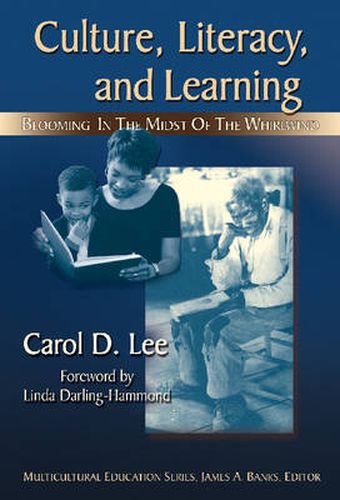Readings Newsletter
Become a Readings Member to make your shopping experience even easier.
Sign in or sign up for free!
You’re not far away from qualifying for FREE standard shipping within Australia
You’ve qualified for FREE standard shipping within Australia
The cart is loading…






How can educators improve the literacy skills of students in a historically underachieving urban high school? In this timely book, the author draws on her experience as a participant observer to provide a unique, insider’s view to both designing and implementing a culturally responsive approach to improve learning and teaching in a specific subject area. The Cultural Modeling Project, which she presents here, drew on competencies students already had in African American Vernacular English (AAVE) discourse and hip hop culture to tackle complex problems in the study of literature. Using vivid descriptions from real classrooms, she describes how AAVE supported student learning and reasoning; how students in turn responded to the reform initiative, and how teachers adapted the cultural framework to the English/language arts curriculum. While the focus is on literacy and African American students, the book examines the functions of culture in facilitating learning and offers principles for leveraging cultural knowledge in support of subject matter specific to academic learning. This much awaited book offers important lessons for researchers, school district leaders, and local practitioners regarding the complex ways that cultural knowledge is constructed and plays out in classroom life, in the life of a school, and in the life of a whole-school reform initiative.
$9.00 standard shipping within Australia
FREE standard shipping within Australia for orders over $100.00
Express & International shipping calculated at checkout
How can educators improve the literacy skills of students in a historically underachieving urban high school? In this timely book, the author draws on her experience as a participant observer to provide a unique, insider’s view to both designing and implementing a culturally responsive approach to improve learning and teaching in a specific subject area. The Cultural Modeling Project, which she presents here, drew on competencies students already had in African American Vernacular English (AAVE) discourse and hip hop culture to tackle complex problems in the study of literature. Using vivid descriptions from real classrooms, she describes how AAVE supported student learning and reasoning; how students in turn responded to the reform initiative, and how teachers adapted the cultural framework to the English/language arts curriculum. While the focus is on literacy and African American students, the book examines the functions of culture in facilitating learning and offers principles for leveraging cultural knowledge in support of subject matter specific to academic learning. This much awaited book offers important lessons for researchers, school district leaders, and local practitioners regarding the complex ways that cultural knowledge is constructed and plays out in classroom life, in the life of a school, and in the life of a whole-school reform initiative.